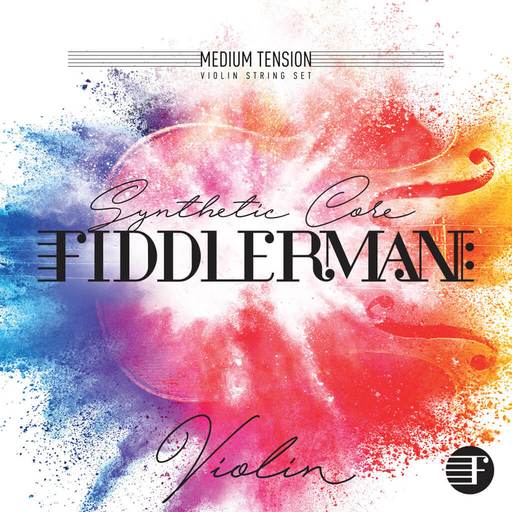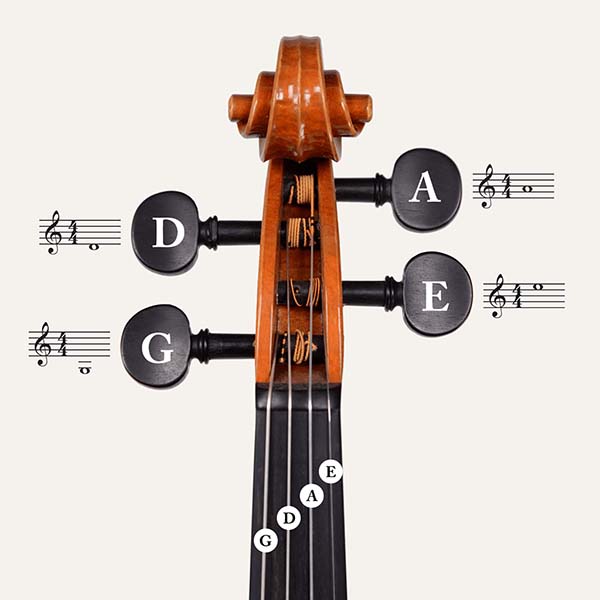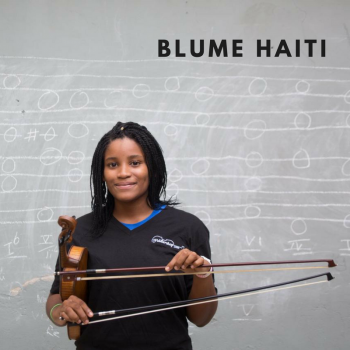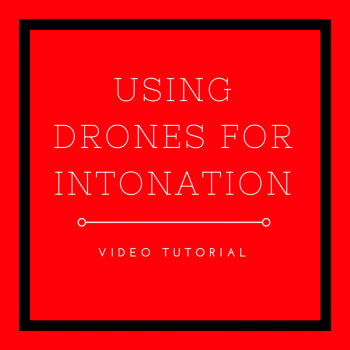The Power of Alexander Technique
By Jasmine Reese - Every musician wishes for the most comfortable journey on their instrument. Can you imagine pain-free violin playing? What about performance and practice without the pressure of your own self-doubt and over-critical inner thoughts? Alexander Technique (AT) teaches both.
Violinist Jennifer Roig-Francoli
is not only a practitioner, but an Internationally recognized coach of AT. She promotes the idea of AT as part of all musical education because she's seen the benefit in her own life and career.
Learning to free ourselves from the mental and physical pressures of everyday life is so important. Jennifer is sharing her story, so more people enjoy a lifelong career and relationship with music.
How did Alexander Technique come into your life?
I was introduced to the Alexander Technique (AT) when I was a violin student at Indiana University, studying with Josef Gingold. [However], I didn’t start taking lessons until much later when I had neck pain that didn’t respond to regular physician care or chiropractic treatments.
I was feeling miserable, so that first taste of mind-body freedom [as a result of] AT felt like a real miracle. After only two lessons, my neck pain was completely gone, and my whole body felt flexible and relaxed like when I was a child. I felt ecstatic, and I could sense how this was transforming my life as well as my violin playing. After a few months, I knew I wanted to study it in depth, so I spent the next three years training to be an Alexander teacher. I’ve loved teaching it ever since.
What is Alexander Technique?
The Alexander Technique is a simple awareness tool that gives me better control over my mind and body; I feel better and everything I do gets easier. When I practice AT for just a few minutes a day, I find that I’m able to stay calm and positive, even under the most stressful performance or audition conditions.
It makes me more creative and efficient with my practice time, too, because I can identify when my thinking is getting in my way, and when my habits cause my body to tense up, instead of letting the music flow out naturally. It constantly amazes me how much better I sound when I let go of all that excess tension, and how I can play difficult technical passages effortlessly, even after spending very little time with my instrument.
What are some of the most inspiring recoveries with AT you've seen or been apart of?
So many of my students have experienced dramatic results from studying AT. Here are three stories that come to mind.
'Nancy' was just about to have surgery for TMJ syndrome -- extreme tension in her jaw -- but first she came to me on the recommendation of her music teacher. In her first lesson, we discussed her jaw for a few minutes, and then moved on to other topics. Over time, Nancy’s sound freed up, and her performance anxiety radically diminished.
It wasn’t until I bumped into her teacher a year later, and her teacher remarked how great it was that Nancy had been able to avoid surgery. I had to laugh out loud when I bumped into Nancy later that week and asked her about her jaw. She gave me a blank look before saying, “Huh? My jaw? Oh, yes, it’s just fine. Wow, I totally forgot about that!” We’d both completely forgotten about it, because it was no longer an issue after the very first lesson.
Another story is from a current student in one of my group classes who practices her instrument four hours a day. She signed up for my class, because she was experiencing a lot of back pain every time she played. After just one class and five minutes of daily AT practice at home for two weeks, she announced at the second class that she was pain-free for the first three and a half hours of every practice session.
On the days she forgot to do her AT homework, her back hurt after only ½ hour at the instrument. At her third class two weeks later, her pain was non-existent. This was, by the way, is a class in which I communicate all of my teaching verbally, without touch.
My third story is about a woman who came to an introductory workshop with extreme performance anxiety. She told me before class that she was too nervous to take part, but I coaxed her to explore her fears in the masterclass anyway. I’ve rarely seen anyone so afraid of playing anything in public, but by the end of that class, she was able to relax and play a scale for us without the slightest hint of anxiety. She sent me this note afterwards:
“Hopefully I can put into words the depth of emotion and gratitude I feel! I am amazed at how much things have changed in my body, which I began noticing immediately after the workshop. Even as I’ve experienced numerous high stress situations, I’ve been able to stay unusually calm and centered. I have continued doing the Cycle* and I’m excited to see what happens after a week! I feel a new peace and confidence about performing solo.” – Erin W.
Some of my favorite stories are actually from people I’ve never met personally who have experienced big changes just from trying out the ideas I share online by themselves.
(JENNIFER HAS OFFERED A FREE DOWNLOAD OF HER CHECKLIST AND STARTER GUIDE TO FIDDLERSHOP BLOG READERS. CLICK HERE TO DOWNLOAD.)
Do you think AT should be introduced in the early stages of one's musical education?
I’ve often wished I had access to the power of AT when I was young and aiming for an international solo career. I was naturally talented and blessed with so many advantages, but I still knew that something essential was missing from my technique. Nobody else could tell, but I always had a sneaking suspicion that I just wasn’t good enough to be able to overcome my limitations and have the success I craved.
Now I know exactly what was missing, and I’m excited to see where this knowledge will take my violin playing over the next decades. If only I’d had these mind-body skills back when I was a student, I could have avoided a lot of suffering and had much more fun along the way!
I believe very strongly that EVERY music student – of any age or skill level – should be exposed to what Alexander discovered. Every musician needs to have the chance to play their instrument without compromising their physical and emotional well-being! AT just makes everything so much easier right from the beginning.
What are your musical goals?
Now that my first son has gone off to college, I’m in a unique transition period in my life which is giving me more time to explore what’s possible for my future. I’ve spent many years working on integrating everything that I care about most: music, meditation, Alexander Technique, teaching, community, love; I’m now watching things fall into place in very beautiful and unexpected ways.
My deepest wish is to communicate music’s uplifting beauty and healing power to the world with joy, and I love teaching others how they can do this, too! Every time I remember that I’m already accomplishing this – one step at a time – I feel truly successful and deeply happy.
As for my violin, I’m becoming more and more curious about what’s actually possible for me, and I wonder where it will take me as I commit to more regular practice and application of AT to improve every aspect of my music and my life.

What are you most proud of? What have you accomplished that makes you proud of yourself?
I always smile when I remember the day I dared to play barefoot in a recital at Carnegie Hall, feeling as natural and free as the colorful birds on my black silk dress! It felt like a crowning career achievement to have the courage – the chutzpah – to walk onstage and welcome my audience into that famed, crystal-chandaliered space with the same comfort and ease as if I were inviting dear old friends into my living room. I enjoyed every minute of that performance!
As an aside, the percussionist Evelyn Glennie inspired my initial desire to perform barefoot way back when I was a member of the Rochester Philharmonic Orchestra, and she performed as our soloist. Ms. Glennie is deaf, yet she blends perfectly with an orchestra by feeling all of the vibrations that rise up from the stage through her bare feet. I wanted to experience that, too! I finally decided that I didn’t need to be deaf to justify having access to that whole-body musical experience, but it took me years to dare to walk onstage senza footware. I now play with or without shoes, depending on the specific situation and my mood.
As an aside, the percussionist Evelyn Glennie inspired my initial desire to perform barefoot way back when I was a member of the Rochester Philharmonic Orchestra, and she performed as our soloist. Ms. Glennie is deaf, yet she blends perfectly with an orchestra by feeling all of the vibrations that rise up from the stage through her bare feet. I wanted to experience that, too! I finally decided that I didn’t need to be deaf to justify having access to that whole-body musical experience, but it took me years to dare to walk onstage senza footware. I now play with or without shoes, depending on the specific situation and my mood.
What have you overcome (emotionally, externally and/or physically) to get to the point you are at today?
I was born into a musical family, and I was only two years old when I decided I “needed” a violin. I lived and breathed the violin for my whole childhood, but at age 19, I gave up “the possibility of a major career” to follow my heart into a quieter, more secluded and spiritual way of life. I got married at age 20, and would have quit the violin altogether if my husband and others hadn’t urged me not to.
I spent the next 25 years maintaining my skills to an acceptable standard with minimal effort, continuing to perform sporadically, while going for months without even touching my violin. I had no motivation whatsoever to improve my playing, and I often felt like I was forcing myself to play when I didn’t want to, and in less than ideal situations. I experienced my first bouts of performance anxiety when I was a section member in the back of a second violin section, so I have first-hand experience with how powerless that feels.
It’s been a very long and emotionally difficult road to grow into a more mature relationship with my violin after a quarter of a century of neglect. But I’ve been sticking with it, facing my fears and feeling the pain, which has coincided with the completion of my 26-year marriage. I can now see that I was made to play the violin, that my talent is a precious gift, and that I absolutely “need” to nurture it to be fully myself. This kind of soul-work is demanding and truly humbling, but it’s unavoidable to uncover the treasures of the heart. The only way to artistic mastery is through self-mastery.
It was only a few years ago that I first got an inkling of how much my soul suffered from having cut myself off from my original love of the violin, a very deep, old source of creative nourishment. And it has only been this year that I’m experiencing the first stirrings of a renewed desire to master the art of playing the violin. I’m finally starting to reap the benefits of those challenging years and I’m enjoying some tremendous breakthroughs. Everything is coming together with increasing clarity, and it’s getting easier and easier to share the value of what I’ve been learning with others.
The Alexander Technique has been such a Godsend to me in so many ways and such an indispensable tool on my journey. It is now my life’s work, and my great joy to inspire others through sharing my personal musical process, and to show others how they, too, can go beyond
their own physical and emotional suffering and discover pure joy in their music-making.
I hope readers here will join me on the musical road to self-discovery, and enjoy the support of an amazing network of like-hearted musicians in my Musical Practice Community – a free group on facebook!
(JENNIFER HAS OFFERED A FREE DOWNLOAD OF HER CHECKLIST AND STARTER GUIDE TO FIDDLERSHOP BLOG READERS. CLICK HERE TO DOWNLOAD.)





